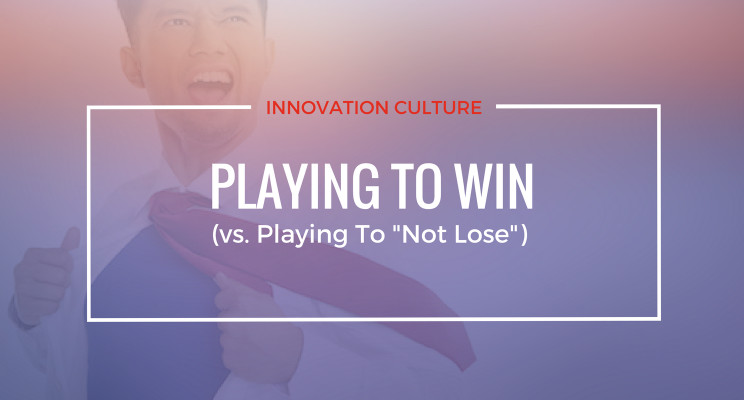
Innovation Culture: Playing To Win (vs. Playing to "Not Lose")
Innovation.
The word sparks both fear and excitement into the hearts of leaders everywhere. In today's world, we know that getting it right is the path to success...and getting it wrong...well, that's a whole different story.
Do You Have A Winning Innovation Culture?
There are three major cultural mistakes companies make when attempting to successfully implement (and then repeat) innovation processes.
Mistake #1: Failing To Actively Prevent Omission Bias
Omission bias is one of the biggest problems most leaders fail to counteract in their company culture. Consider a lesson from behavioral economics: in almost all situations, when a person has less power than another, omission - the status quo - will be less blameworthy than action (especially action that has the potential for failure).
Behavioral Economics: Omission is often less blameworthy than action.
When leadership doesn't take preventative measures to counteract omission bias, the result is inaction - the death of innovation.
Mistake #2: A Crumbling Architecture of Participation
When it comes to any process - but especially an innovation process- there must be an architecture of participation. Who goes where, when?
The process itself is a structure, that must be carefully built, in order to have a strong innovation culture that gets winning ideas to the finish line. Getting the wrong people on board an innovation project at the wrong time leads to a crumbling structure, and one that cannot sustain a successful innovation process.
With that in mind, a mistake companies often make is using the same people to lead all parts of an innovation process. A winning culture of innovation takes into account the specific strengths of the major stakeholders and plugs them into the part of the process where those specific strengths will do the most good.
Most company cultures, however, fail to understand who should go where, and when certain stakeholders should be involved in the innovation process to create the best, and most efficient, forward momentum. This lack of architecture is a major reason for failing structures.
The most effective method of getting the right people in the right place is to have a fundamental understanding of an individual's propensity to action in the face of the unknown. This action mode is also referred to as "conation" - an individual's innate instincts to problem solving that make up effective (or ineffective) teams.
Mistake #3: Ineffective Balancing Capacity For The Present And Future
Companies, no matter how large, very rarely have true bandwidth for effective innovation processes. Unless the company is in a state of constant, rapid ideation and execution, individual teams members will have competing items on their plate that demand attention.
When people that are responsible for delivering results in the present have to think for/solve for the future, the present needs will certainly crowd out the future. Immediacy has primacy - and this is not good for innovation.
To combat this, combining agile talent with existing company talent is an excellent way to stay in the game. You receive all the benefits of focused attention on future needs with embedded company knowledge - an effective, and efficient, way to scale innovation processes.
Playing To Win In Innovation Culture: How To Get It Right
Innovation isn't magic. You can't conjure it out of thin air, and it won't make itself happen. It requires the combined strengths of both people, and process. If you're going to play to win, instead of playing to not lose, you need to get both right - every time.
Nicole Wipp is the founder and CEO of Wipp Enterprises LLC, a consulting and training firm that provides a range of leadership, team creation, team building and retention services to large companies, and to the small business/entrepreneur market as NicoleWipp.com. She also leads a highly successful boutique elder law firm.
In these capacities, Nicole is a sought after expert on numerous topics related to building successful businesses through powerful teams, has spoken on numerous stages nationwide, is a frequent guest on top podcasts, and has authored a number one bestselling book. Wipp Enterprises is a Kolbe Certified solutions provider and is certified as a Women’s Business Enterprise by the Women’s Business Enterprise National Council (WBENC).

Transplant Center Administrator | Hospital Operations | Integrator | Relationship Builder
7yThis spoke to me... Nice work